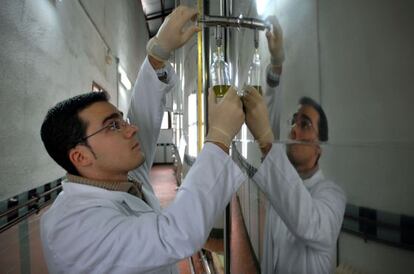Finding virtue in the run of Andalusia’s olive oil mills
Spanish business study on family-owned companies in Jaén province triumphs in the United States

What do people mean when they talk about the socioemotional wealth of family-owned companies? This relatively new concept covers non-financial aspects linked to the exercising of power; the satisfaction derived from a sense of belonging, warmth and intimacy; the perpetuation of family values through the company; and the preservation of a family dynasty and its social capital.
The concept was coined by the authors of a research paper entitled "Socioemotional Wealth and Business Risks in Family-Controlled Firms: Evidence from Spanish Olive Oil Mills," which has received two prizes this year in the United States as a result of its global impact.
The study, which was published in the prestigious Administrative Science Quarterly, looks at the history of 1,298 family-owned olive oil mills in the southern Spanish province of Jaén over more than 50 years in order to understand how the fact that a company is family-owned influences its risk-taking behavior.
The study challenges the conventional idea that family companies are more risk-averse than others because of the concentration of ownership in a single company. "This traditional idea doesn't take into account the fact that family companies are interested in not only achieving financial targets such as profits, but also in preserving so-called socioemotional wealth," says José Moyano, a lecturer at the University of Jaén (UJA) who authored the paper in collaboration with Luis R. Gómez-Mejía of Texas A&M University; Katalin Takács Haynes of the University of Delaware; Manuel Núñez-Nickel of Carlos III University in Madrid and Kathryn J. L. Jacobson of the University of New Mexico.
Family companies are willing to assume financial losses and bear a greater risk of failure"
The result of the study indicates that family companies are willing to take more risks to preserve their socioemotional wealth. They also show that the predisposition to retain control of the firm is stronger when the socioemotional wealth is greater; that is, when the company is in the hands of its founders or their heirs. "Family companies are willing to assume financial losses and bear a greater risk of failure to maintain control of the company," Moyano explains.
The study also concludes that family companies worldwide emerge and survive from generation to generation not because they are more efficient or more profitable but because they adjust to the socioemotional needs of their owners. "In the context of the current crisis, family companies that employ a high percentage of the population would be willing to carry on and conserve their socioemotional wealth even though their profits are modest in order to preserve jobs," Moyano says.
Family firms account for between 50 and 80 percent of the GDP of the majority of companies in the world; in Spain the figure is 65 percent. They also account for 85 percent of the total number of firms in the country and 42 percent of jobs.
"This is one of the few studies on corporate governance that uses non-conventional data in an international environment," Moyano says.
The two prizes it has won are the 2013 Greif Research Impact Award from the Lloyd Greif Center for Entrepreneurial Studies of the University of Southern California and the 2013 Administrative Science Quarterly Award for Scholarly Contribution.








































